By Yusra Syed, V Form
Namaste from Karanjo
My trip to India this past summer was the best decision I have ever made in my teenage years. As a youth ambassador to several charities and organizations that are actively working in India, I heard about Ekal Vidyalaya and the wonderful work that they were doing in the rural tribal areas of India. Last summer, I visited urban areas of India with other organizations and traveled with my family; however, I had never seen remote areas of India and was curious about the work Ekal does for the people living there. Their presence in the the less targeted areas of India sparked my interest, as I understood some of the challenges that India faced as a country.
Some of the challenges that India faces include: 
- Lack of Education
- Urbanization
- Limited access to Healthcare
- Gender Roles
- Lack of Sanitation
- Water Scarcity
- Financial Transparency
I decided to apply for an international travel grant from St. Mark’s School to visit the Ekal projects in Karanjo. When I found out that I was awarded the grant, I was exhilarated; many questions flooded my mind and my curiosity grew. I was thrilled to visit these new places, which was what drove me to start planning the trip. I contacted Ms. Ranjani Saigal, Executive Director of Ekal USA, and her encouragement to visit one-teacher schools and other Ekal projects accelerated the process.
On my trip, I had the privilege of meeting the CEO of Ekal India, Mr. Bajrang Bagra, at my first stop in New Delhi, India. He gave me an overarching view of the Ekal culture and the spirit of volunteerism. Under his leadership, Ekal has taken financial transparency to the next level by monitoring and reporting the costs and donations associated with the various projects. It takes a dedicated effort to do this for over 50,000 schools in India, but the prevention of corruption is crucial to the impact an organization has in India.
From New Delhi, I flew to Ranchi, Jharkhand and visited the headquarters of the Ekal Gramothan Foundation. I met Mr. Arun Khemka, the President of the Foundation, and Mr. Lalan Sharma, the Program Director of the Foundation. I had the opportunity to address the Ekal volunteers from all over India who had gathered in Ranchi. Mr. Sharma was kind enough to show me all the projects that the Foundation is promoting to uplift rural India socially and economically. One such project is “Poshan Vatika”, which ensures that farmers not only produce good crops, but feed themselves and their families nutritionally balanced meals made with freshly grown produce, leading to healthy development of their children and families.

Speaking to the volunteers at Ekal Gramothan Foundation in Ranchi.
From Ranchi we drove three hours to the remote village of Karanjo. Karanjo is one of the Ekal Gramothan Resource Centers (GRC) and is a model that is replicated across most rural areas in India. The main aim of these GRCs is to make the village community economically self-reliant and develop villages as the centre of economic activity. Volunteers at GRCs teach farmers new techniques, motivate and educate the villagers to adopt an eco-friendly life, provide skill development training to youth and women for better livelihood, and promote agriculture-based local entrepreneurship.

Model of Ekal Gramothan Resource Centre.
I was contemplating what to do for the three hour drive, for it was a long time without entertainment or something to occupy myself. However, the drive to Karanjo was absolutely beautiful; staring out the window and chatting with the Ekal volunteers riding with us proved to be three hours well spent. We crossed over the Saranda-Singhbhum mountain range to get to the other side of the valley. This valley is well known for elephant sightings, as well as rare tiger sightings at a nearby pond 25 miles south of Karanjo.
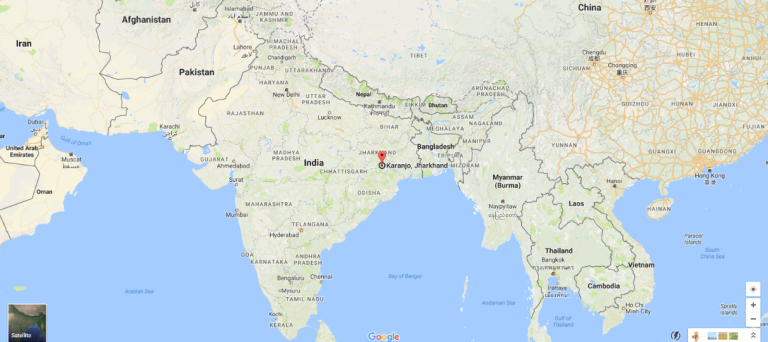
Map showing Karanjo in the state of Jharkhand, predominantly a rural state in Eastern India.

Route from Ranchi, Jharkhand to Karanjo, Jharkhand.
Karanjo was an unforgettable experience that prompted me to think about how life in a rural village might be. I stayed there for 3 days and visited all the Ekal projects. One such project is Ekal on Wheels – a bus equipped with computers that travels to different villages to teach local farmers how to use the computer. I visited a village where the farmers and their children learned digital literacy through the use of Word, Excel, Paint, etc. I hadn’t seen such enthusiasm to learn computers for a while. I saw how the youth in the villages are trying to learn computers to be relevant and help their families in their farming business.
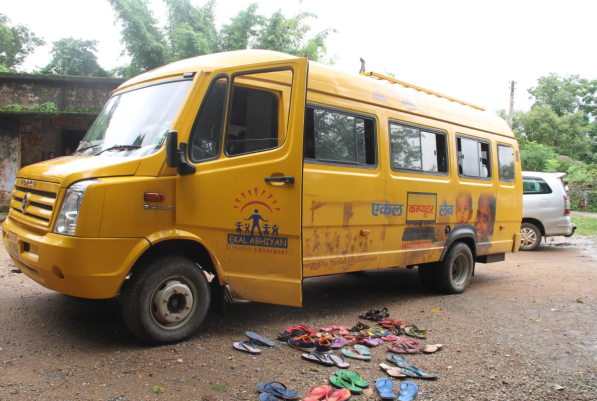
‘Ekal on Wheels’ bus that drives to different villages to teach computer skills.
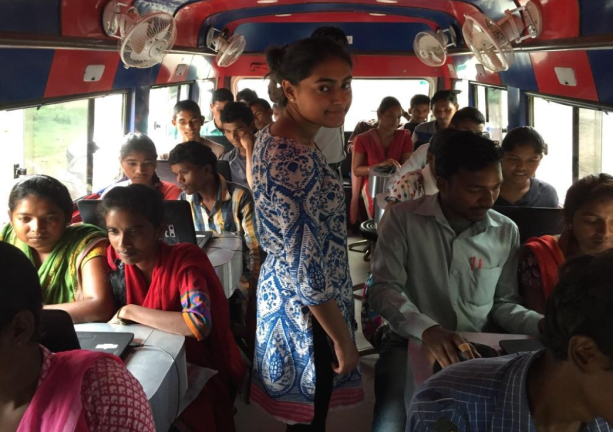
Inside the ‘Ekal on Wheels’ bus.
Another project – my particular favorite – was a group of women at a tailoring training center who are part of the Girls Empowerment Program. These group of girls gathered at the teacher’s home; the teacher was a woman only a few years older than the others. I spent some time with them learning the art of cutting and sewing clothes and even tried sewing a blouse with a sewing machine. It was not as easy as they made it look, but I learned a new skill! As a piece of them to take back with me, I bought a sari blouse stitched by them for Rs. 200 (approximately $3). It made me happy to see these women taking pride in their work and eager to learn all they could from their teacher and peers.
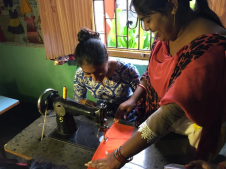
At the Karanjo sewing school.


With fellow Ekal volunteers in Karanjo.
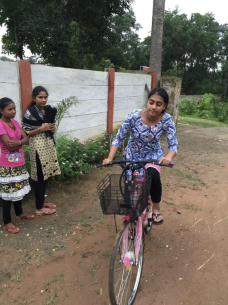
Riding a bicycle in Karanjo – a primary mode of transportation in the village.
The main focus of Ekal Vidyalaya is to run one-teacher schools all over India in the most remote, rural, and tribal villages, and provide education to every child. The overriding philosophy of the Ekal Vidyalaya Movement is to take a holistic approach of the social and economic development to tribal and rural India. With the participation of numerous trusts and nonprofit organizations, this movement has become the largest grassroots level non-governmental education and development movement that operates in the remote villages of India. The Ekal movement aims to help eradicate illiteracy from rural and tribal India. After all, only education can eradicate poverty, and thus allow poor families to aim for higher level jobs.


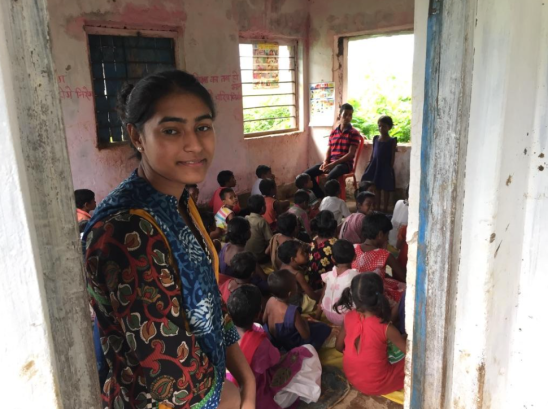
Visiting a one-teacher Ekal School.
After returning from India, I was invited to meet and share my experience with the Ekal USA team in New York on September 18, 2016. It was great to see the volunteers from Ekal India, Mr. Bajrang Bagra, Mr. Arun Khemka, and Mr. Lalan Sharma at the conference. I had met them and interviewed them just before my trip to Karano. They were curious to hear about my experiences in the remote village in India, and I hope my presentation at the conference covered it all. I also got to meet the Ekal USA team led by the President, Vinod Jhunjhunwala, and the Chairman, Dr. Rakesh Shreedhar. By taking advantage of a new opportunity, I built some everlasting friendships in my quest to understand and serve the children in rural India.

Speaking at the Ekal US conference in New York on September 18, 2016.
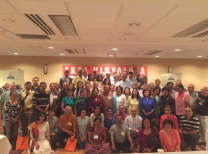
With the Ekal family in New York, USA.

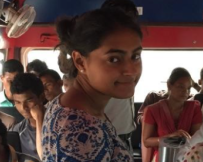 Yusra Syed is a V Form day student from Shrewsbury, MA. She is a student ambassador for various non-profit organizations and is involved in promoting social entrepreneurship to solve the problems of child education and hunger in developing countries. In her spare time, Yusra enjoys playing soccer and experimenting in the kitchen.
Yusra Syed is a V Form day student from Shrewsbury, MA. She is a student ambassador for various non-profit organizations and is involved in promoting social entrepreneurship to solve the problems of child education and hunger in developing countries. In her spare time, Yusra enjoys playing soccer and experimenting in the kitchen.


